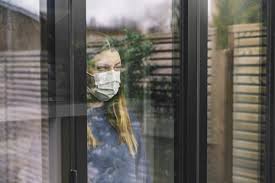The health of Australians stuck at home is the focus of a $1.1 billion package to boost telehealth and tackle the hidden side effects of the pandemic such as domestic violence.
All Australians will be able to consult a GP from home under expanded access to telehealth services such as phone consultations or video-conferencing.
More money will go to domestic violence programs amid warnings of a possible surge in family violence with people forced to stay at home.
Funding will also cover mental health and charities as stressed and anxious Australians struggle with the impacts of job losses and social distancing restrictions.
The new support comes as thousands of returning Australians are shuttled from airports to makeshift quarantine hotels guarded by police, army and security for mandatory 14-day isolation.
Under the measures which came into effect midnight Saturday, families have been told they cannot see their loved ones who are being housed in state-funded hotel rooms in a bid to stop travellers spreading the virus in the community.
About two-thirds of the country’s 3635 cases are from or closely linked to overseas travellers.
In Sydney alone, 3000 people are expected to land on Sunday and will be discreetly processed before being admitted to a hotel room.
“We will treat these people with absolute respect and dignity but we will need their support,” NSW Police Commissioner Mick Fuller said.
“The 14 days, I am sure, will be a challenge for them and perhaps the food is not up to standard or they feel that the bed is not as comfortable as their own.
“They need to understand that we are trying to protect the community of NSW.”
Deputy federal chief medical officer Paul Kelly said the compulsory quarantine was supported by the “very best” medical evidence.
He said a “blanket lockdown” hadn’t been implemented in Australia because “unlike countries such as Italy, Spain and Iran, and cities such as Wuhan in China, we have remained ahead of the curve”.
Health subsidies expanded
The bulk of the Morrison government’s $1.1 billion package will expand Medicare subsidies for telehealth to the entire population, with $669 million to cover consultations by phone or video-conferencing such as FaceTime or Skype.
Charities and community organisations that give emergency relief, such as food banks, and financial counselling will receive $200 million.
Another $150 million will boost existing domestic violence programs amid warnings of a possible surge in family violence with people forced to stay at home.
To encourage GP practices to stay open for people who still need face-to-face services, the bulk billing incentive will be doubled between now and the end of September.
Prime Minister Scott Morrison said the latest round of spending aimed to deal with the secondary effects of the health and economic crises the coronavirus is causing.
“As we battle coronavirus on both the health and economic fronts with significant support packages in place and more to come, I am very aware many Australians are understandably anxious, stressed and fearful about the impacts of coronavirus and what it brings,” he said on Sunday.
“We will get through this crisis by staying together, by supporting each other and ensuring that no Australian, even though we have to be isolated, should have to go through this alone.”
Domestic violence services have warned about a likely spike in violence as people are forced indoors through the social distancing needed to stop the spread of the virus.
They pointed to increased domestic violence rates in China while it shut down.
And Google has told the government is it seeing a massive increase in people searching online for domestic violence help, spiking in the first week of March to the highest number of searches in five years.
Funding to services will include counselling, the 1800RESPECT domestic, family and sexual violence counselling service, Mensline Australia, the trafficked people program, and support for women and children experiencing violence to protect themselves to stay in a home of their choice when it is safe to do so.
To bolster mental health, a new dedicated coronavirus wellbeing support line will be set up by BeyondBlue, funded with $10 million from the federal government and $5 million from Medibank.
It will help people who are concerned because they have been diagnosed with the disease, or are experiencing stress or anxiety due to employment changes, business closure, financial difficulties, family pressures or other challenges.
As well, the government will give existing mental health support line services, including Lifeline and Kids Helpline a $14 million boost.
There will also be dedicated support for health workers, older Australians, indigenous communities and young people.

